- Home
- Lois Lowry
Your Move, J. P.!
Your Move, J. P.! Read online
Your Move, J.P.!
Lois Lowry
* * *
Houghton Mifflin Company
Boston
* * *
Library of Congress Cataloging-in-Publication Data
Lowry, Lois
Your move, J P.! / Lois Lowry.
p cm
Summary Lovestruck J P. finds himself doing all sorts of weird things to
impress his new interest but his life becomes very complicated when a simple
lie gets out of control.
ISBN 0-395-53639-1
[1 Interpersonal relations—Fiction 2 Honesty—Fiction.
3. Schools—Fiction.] I Title.
PZ7.L9673Yo 1990 89-24707
[Fic]—dc20 CIP
AC
Copyright © 1990 by Lois Lowry
All rights reserved. For information about permission
to reproduce selections from this book, write to
Permissions, Houghton Mifflin Company, 215 Park Avenue
South, New York, New York 10003.
Printed in the United States of America
QUM 10
1
It was an April morning—a Tuesday morning, to be exact—a morning that had nothing whatsoever unusual about it. The sun was shining, the trash had been collected from the sidewalk, the breakfast toast was moderately burned but still edible, and the various clocks in the apartment, which never agreed exactly, indicated that it was somewhere close to seven-thirty A.M.
It was a morning just exactly like every other Tuesday morning in April on the West Side of New York City, except for one thing.
James Priestly Tate, age twelve, had an overwhelming urge, for the first time in his life, to use deodorant.
He tried to ignore it at first. But he found that he was not able to put on his shirt. His arms were paralyzed. When he attempted to manipulate his arms to enter the armholes of the light blue button-down shirt that was part of the uniform he wore every day to school, they wouldn't move. They weren't ready to move toward those armholes—and they wouldn't be ready until James Priestly Tate used deodorant.
Frowning, J.P. headed back to the bathroom of the apartment. He had already been there once, and brushed his teeth. J.P. was a dedicated, almost religious, toothbrusher. He had been devoted to brushing his teeth from the time he was three years old and a dentist uncle had given him a green toothbrush with a frog's face on the handle.
He had already combed his hair and tied his shoes. He was wearing his chino pants, also part of his school uniform.
But he was shirtless when he stood at the bathroom door, thumped on it with his fist, and called to his ten-year-old sister inside.
"Caroline, hurry up!"
"I can't hurry up, I'm in the shower! You had your turn already. I thought you were all through with the bathroom!"
"I forgot something. I need something," J.P. called through the closed door.
"What do you need?" Caroline called back. "I'll hand it out."
Oh, great. J.P. couldn't stand his sister to begin with, and now he had to call his most intimate needs to her through a bathroom door. He should forget the whole thing. But he couldn't. He had this overwhelming urge to use deodorant. He couldn't figure it out. He didn't even smell. It wasn't as if he had just run the marathon or something. But he had this urge; and the urge was so great that he was even willing to embarrass himself in front of Caroline.
"Deodorant!" he bellowed through the door.
He heard the sound of the shower stop. He heard the rustle of the shower curtain. He heard the door of the medicine cabinet click open. Then the bathroom door opened an inch, and his sister's hand appeared. It thrust a plastic container at him.
"Here," said Caroline, and closed the door again.
J.P. looked down at the pale green aerosol can, which was decorated with yellow flowers. He uncapped it and sniffed it. He looked at its name: Sunny Meadow.
He made a face. He wanted deodorant. He maybe even needed deodorant. Certainly he had an overwhelming urge to use deodorant.
But he didn't want to enter his seventh-grade homeroom smelling like a sunny meadow.
He headed for the kitchen, where his mother was cleaning up the breakfast dishes.
"Hi," Joanna Tate said cheerfully. "Where's your shirt?"
J.P. didn't answer. He held out the bottle of Sunny Meadow toward her. "Is there any other deodorant in this apartment?" he asked.
She shook her head. "No. Why?"
"This is too feminine," J.P. explained. "It smells like flowers."
"Well, of course it does. That's why I like it. Also, it's cheaper than some of the others."
"Next time you go shopping, would you buy something with a more masculine smell, and something with a more masculine name?"
Mrs. Tate nodded. "I guess so. I didn't know you even used deodorant, James. You smell okay to me." Then she stared at him affectionately for a moment. "But I forget how old you're getting. Twelve. My goodness. You're an adolescent already. Next thing I know, you'll start shaving. Let me see your chin for a minute."
She reached for J.P.'s chin, cupped her hand around it, and held it up toward the light. He pulled away, irritated.
"My chin's fine," he muttered. "I don't need to shave. I just want to deal with my pits, is all. But I don't want to smell like wildflowers."
"What would you like to smell like?" his mother asked, turning back to the breakfast table. "Locker room? Auto body repair shop?"
"Ha ha," J.P. muttered, heading back to his room.
His sister, Caroline, appeared in the hall, combing her damp hair, wearing her bathrobe. "Jockstrap?" she suggested cheerfully. "Super Bowl?"
"Quit eavesdropping," J.P. said. He entered his bedroom and picked up the blue shirt that he had left on his unmade bed. He dropped the Sunny Meadow deodorant unopened on his desk and finished dressing. Tomorrow, he thought. Tomorrow he would use deodorant, and tomorrow maybe he would smell strong and masculine and pleasant during second period when he went to math class and sat down in his seat next to—
J.P. blushed, all alone in his room, with his shirt half-buttoned. That was it, he realized. Be honest with yourself, Tate; it's because there was that empty seat next to yours in math class, and now all of a sudden it isn't empty anymore because that new student arrived last week and was assigned that seat, and now instead of an empty seat beside you in math class there is an occupied seat, and it is occupied by—
He blushed again. Say it, Tate, he told himself. Say the name. Say it aloud.
J.P. took a deep breath. He checked to be certain that the door to his bedroom was tightly closed, so that his eavesdropping sister wouldn't overhear. And he said it.
"Angela Patricia Galsworthy," he said reverently. He could almost hear violins playing in the background as he said the name aloud.
He could hardly believe it. It had never occurred to him, in his twelve—almost thirteen—years of life, that this might someday happen. Now it had.
James Priestly Tate was in love.
The Burke-Thaxter School was a very small private school. Everyone knew everyone else. The kindergarten kids knew the high school kids. All the students knew the gray-haired janitor, Mr. Donovan, as well as they knew their own grandparents. The entire fifth grade had been invited to the wedding when their teacher, Ms. Jackson, got married; she had sent each one of them—there were thirteen fifth-graders—a postcard from her honeymoon in Acapulco. And now that she was married and her new name was Ms. Jackson-Wyden, all the students, even those in the other grades, watched her husband, Stan Wyden, when he did his nightly newscast on television, even if they weren't at all interested in the news.
When a new student enrolled in the school, everyone knew about it. So it was not
surprising that Angela Galsworthy was well known: not only in the seventh grade but throughout the Burke-Thaxter School.
Unlike most new kids, she hadn't entered at the beginning of the school year. She had arrived and been introduced to the class on a Monday morning in mid-April, just last week.
"Class," said Mr. Goldfine, J.P.'s homeroom teacher, "I'd like you to meet, ah"—he looked at the card in his hand—"Angela Patricia Galsworthy, who has moved here from, ah"—he looked again—"my goodness, London."
J.P. had looked up from the Smithsonian magazine he'd been reading at his desk. J.P. was not at all interested in girls, and it was somewhat surprising that he looked up at all. But Mr. Goldfine had a loud voice, and the article J.P. was reading wasn't very interesting. So he looked up. And when he did, he blinked.
Angela Patricia Galsworthy was wearing the Burke-Thaxter uniform, so her clothes weren't at all interesting. They were the same clothes that all the girls, including J.P.'s sister, Caroline, wore every day to school.
But her hair! Her hair was long and blond, freshly washed, and it looked like— spun gold, thought J.P.
And her teeth! She was smiling at the class, and she didn't have braces like so many of the girls, and her teeth were straight and white, and they looked like— pearls, thought J.P.
Her eyes! They were a deep blue-green, large and fringed with long lashes, and they looked like— pools, thought J.P.
Her skin! It was the same shade as a pale, translucent dish that his mother had inherited from a great-aunt and kept high on a shelf so that it wouldn't break. Her skin was like— porcelain, J.P. thought, remembering the word that described the dish.
Then he blushed, cringed, and slouched in his seat, lifting the magazine again. He couldn't believe the thoughts he'd been having. Hair like spun gold; teeth like pearls; eyes like pools; skin like porcelain. Cool it, J.P., he said to himself; for a moment there you were writing a trashy novel. You're sick.
He could see, suddenly, that the girl was about to speak. J.P. tried to impose deafness on himself because he didn't want to listen. For the first time he envied Kevin Kerrigan, his classmate who wore a hearing aid. Kevin could just switch his aid off whenever he wanted to.
Turn off, J.P. commanded his ears. It is not in your best interest to listen to this.
But for the first time, J.P.'s phenomenal willpower didn't work, and he heard Angela Patricia Galsworthy greet the seventh grade.
"Good morning," he heard her say. "I'm terribly pleased to meet all of you."
And her voice! Her voice was like—oh, no, J.P. told himself; don't even think it—but he did. Her voice, he thought, against his will, was like a rippling brook.
He didn't look up. His face felt flushed and warm. His stomach lurched. His hands itched. His shoes seemed suddenly to be too small; his toes hurt. Quickly J.P. flipped the pages of Smithsonian and began to read much more than he had ever wanted to know about alligators.
He had known the terrible truth that morning, though he hadn't admitted it, even to himself. Now—just a few days later—he realized that it was something he had to face. He would face it with courage and a stiff upper lip and valor and—J.P. winced—yes, he would face it with deodorant.
Slowly he unbuttoned his shirt and, with his eyes closed because that seemed to make it easier, he sprayed himself with Sunny Meadow.
He knew he was doomed.
2
J.P. glanced through the window of his English classroom while Mrs. Hunt talked endlessly about the book they were reading, The Prince and the Pauper. He had read the assigned chapters—J.P. always did his homework—but he thought the book was one of the most boring he'd ever encountered. Even Mrs. Hunt, whom he liked, couldn't seem to make it interesting.
He felt a tap on his shoulder, and Hope Delafield passed him a folded piece of paper. J.P. unfolded it and read: B-B5ch. He thought for a moment and then grinned. Good old Hopie. She had him in check. He and Hope had been playing a chess game on paper for two weeks now and it was at a crucial point. J.P. was the chess champion of the whole school, but Hope, the only female in the chess club, was a pretty good competitor and getting better all the time.
J.P. would have to come up with a supergenius maneuver to get his king out of check. He tried to envision the chess board in his mind. Ordinarily he had no trouble doing that. Ordinarily he could see his next move almost instantly. But today the chess game seemed almost as boring as The Prince and the Pauper. J.P. stared at the paper, and then his eyes drifted to the window again.
Outside, a misty breeze was moving the branches on a scrawny tree, and across the street two pigeons were fighting on the window ledge of an apartment building.
J.P. had never paid attention to pigeons before. New York City, especially this area near Central Park, was filled with pigeons, so many that he didn't notice them unless they flew low directly above him and he had to worry about the possibility of them depositing something disgusting on his head. But now he watched these two peck and flutter, and he wondered if maybe they were male pigeons fighting over a female. On a nearby ledge, a pale gray pigeon sat quietly and observed the quarrel.
That's the female, J.P. decided. To me she looks just like any dumb pigeon. But to those guys—he glanced again at the warring pair—she probably has the prettiest face, the softest coo, the sleekest wingspan. They probably feel as if they can't live without her.
His gaze shifted to the back of Angela Galsworthy's blond head. Today her hair was tied back in a ponytail, and he could see her right earlobe quite clearly. It looked like a tiny seashell, pale pink and perfectly curved.
Carefully, with his ballpoint pen, J.P. drew Angela Galsworthy's earlobe on the lined sheet of loose-leaf paper that lay on his desktop waiting for a chess move.
"Weird, Tate." J.P. heard a whisper, and he saw Kevin Kerrigan, the nosiest person in the seventh grade, leaning over from his desk, peering at the paper.
J.P. scowled at Kevin and covered the paper with his hand. It was weird, he thought. Earlobe to rook 1? Embarrassed, he scribbled over the earlobe and tried to concentrate on the chess move.
Mrs. Hunt's voice droned on. "So you see," she was saying, "the prince, wearing the pauper's clothes, finds himself on London Bridge. Has anyone here ever visited London?"
A few hands shot up. Not J.P.'s. He'd hardly ever been outside New York City, except for the few times when he had visited his father in Des Moines.
"Oh, Angela, of course!" Mrs. Hunt exclaimed, and J.P. jumped at the sound of the name. He looked over, beyond the earlobe, and saw Angela Galsworthy's slender left arm—it had some pale golden hairs on it, he noticed, and a delicate silver watch on its wrist—in the air.
"I almost forgot, Angela," Mrs. Hunt went on, "but of course London is your home, isn't it?"
Angela Galsworthy nodded shyly.
"Did you by any chance live near London Bridge?" Mrs. Hunt asked.
"Oh, no," Angela said. "London Bridge is down near the Tower of London. My house is on Old Church Crescent, not far from Battersea Bridge. The river curves about quite a bit, you see—oh, goodness, it's terribly difficult to explain. It would be easier to explain if I had a map."
J.P. watched her as she talked. He felt warm all over—probably his deodorant was failing him, he was so warm—listening to her waterfall voice, with its British accent.
"Do you have a map of London at home, by any chance?" Mrs. Hunt asked.
"No, I'm sorry," Angela said, shaking her head.
"I'm afraid I don't, either. Class, does anyone happen to have a map of London at home? Someone who could get together with Angela to sort out the geography of this book?"
So many hands shot into the air, it looked as if a foul ball had gone into the stands at a Yankees game. J.P. looked around. Nicholas Kostas had his hand up. Danny Calhoun. Antonio Valdez. Kevin Kerrigan was waving his as if he were trying to hail a taxi.
All boys. That's odd, J.P. thought. No girls have maps of London at home. But practi
cally every boy in seventh-grade English does.
Mrs. Hunt was laughing. "Amazing," she said. "Well, let's see. J.P., how about you? Would you get your map tonight, and then in the morning you and Angela can go over it, before English class?"
J.P. put his hand down. He looked at his own arm in amazement. It had taken on a life of its own, completely independent of his brain. He hadn't even known that it had been in the air. "Sure," he said to Mrs. Hunt.
Angela looked over at him and smiled.
J.P. bent his head and stared at the paper on his desk. Hastily he wrote in a chess move, K-R1, folded the paper, leaned across the aisle, and handed it back to Hope Delafield.
The class ended. The students gathered their books and moved in a group toward the door. Angela Galsworthy, surrounded by a cluster of giggling girls, headed toward her next class. Danny Calhoun shoved Nicholas Kostas against the wall. "You jerk," he muttered. "You don't know London from Hoboken, New Jersey."
Kevin Kerrigan punched his best friend, Antonio Valdez, in the arm. Antonio rubbed the punched place, and both boys turned to glare at J.P. "Big London expert, huh?" Kevin jeered. "I bet you don't even have a map of the New York subway!"
J.P. ignored them. He went to the pencil sharpener on the windowsill and began to sharpen a pencil nonchalantly.
From the doorway of the emptying room, Hope called to him in triumphant surprise. "Checkmate, J.P.!" she called, waving the piece of notebook paper. "No kidding! First time I've ever beaten you!"
J.P. blinked. He didn't even remember what chess move he had written down. He didn't even care.
The only thing he cared about was figuring out how to find a map of London before school tomorrow.
J.P. adjusted the backpack that held his schoolbooks and walked glumly to the corner, where he would get the crosstown bus home. He could see his sister, Caroline, in her school uniform, waiting there already, with two of her fifth-grade friends. She waved.
He ignored her and leaned over to poke in a trash container, hoping that by chance someone had thrown a map of London away. No luck. There were several newspapers, an empty wine bottle, and Nicholas Kostas's crumpled history exam, with a B—written in red ink across the top.

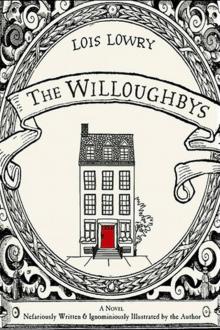 The Willoughbys
The Willoughbys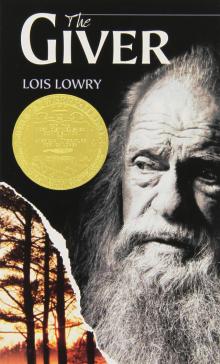 The Giver
The Giver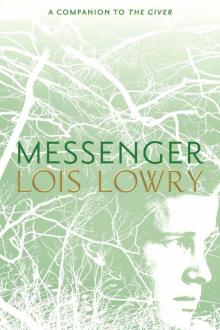 Messenger
Messenger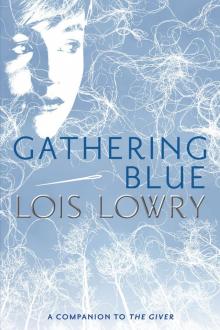 Gathering Blue
Gathering Blue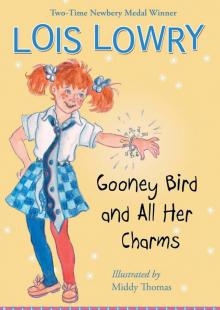 Gooney Bird and All Her Charms
Gooney Bird and All Her Charms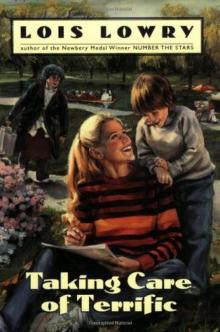 Taking Care of Terrific
Taking Care of Terrific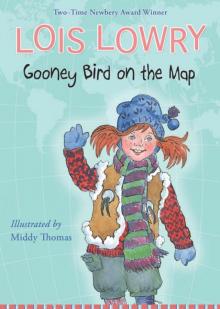 Gooney Bird on the Map
Gooney Bird on the Map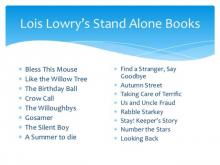 The Birthday Ball
The Birthday Ball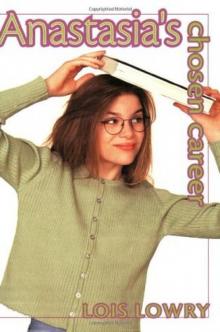 Anastasia's Chosen Career
Anastasia's Chosen Career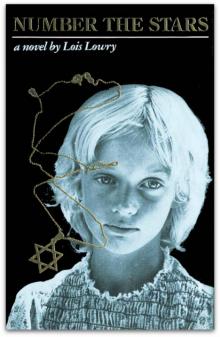 Number the Stars
Number the Stars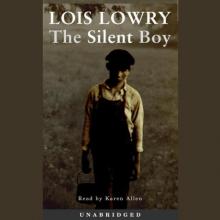 The Silent Boy
The Silent Boy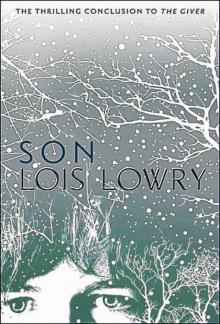 Son
Son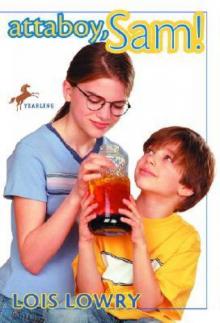 Attaboy, Sam!
Attaboy, Sam!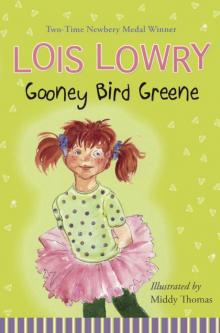 Gooney Bird Greene
Gooney Bird Greene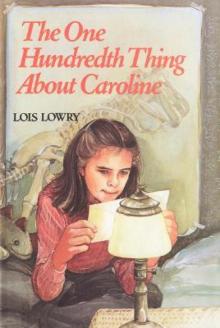 The One Hundredth Thing About Caroline
The One Hundredth Thing About Caroline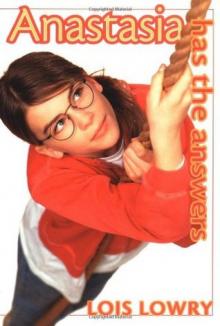 Anastasia Has the Answers
Anastasia Has the Answers Your Move, J. P.!
Your Move, J. P.!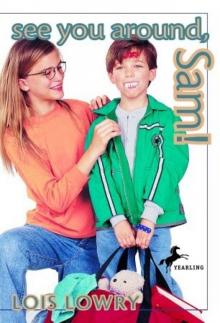 See You Around, Sam!
See You Around, Sam!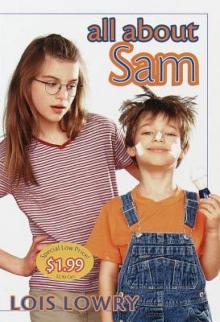 All About Sam
All About Sam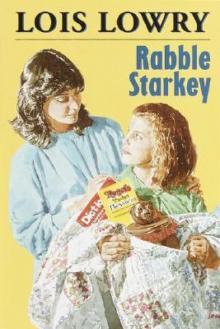 Rabble Starkey
Rabble Starkey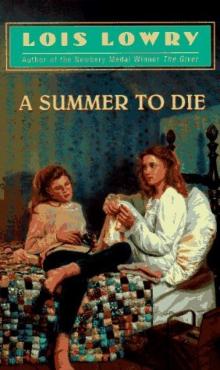 A Summer to Die
A Summer to Die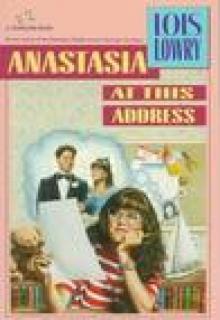 Anastasia at This Address
Anastasia at This Address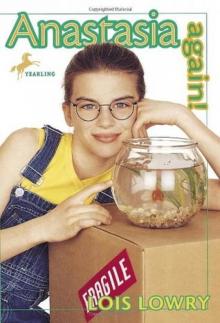 Anastasia Again!
Anastasia Again!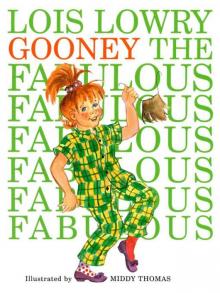 Gooney the Fabulous
Gooney the Fabulous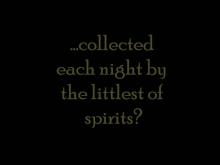 Gossamer
Gossamer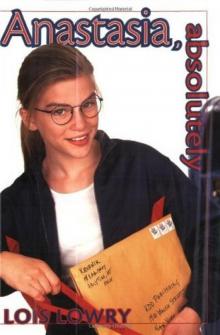 Anastasia, Absolutely
Anastasia, Absolutely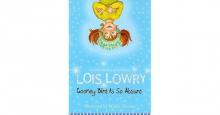 Gooney Bird Is So Absurd
Gooney Bird Is So Absurd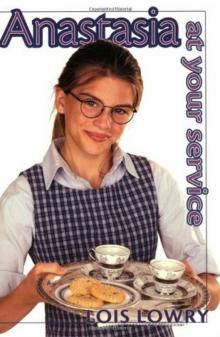 Anastasia at Your Service
Anastasia at Your Service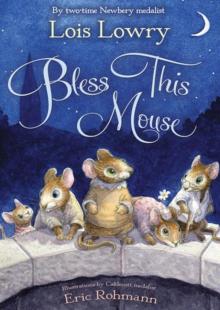 Bless this Mouse
Bless this Mouse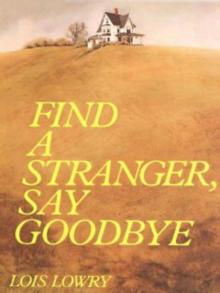 Find a Stranger, Say Goodbye
Find a Stranger, Say Goodbye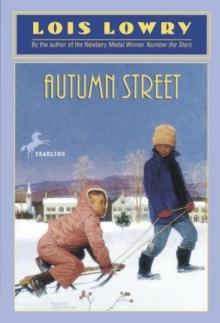 Autumn Street
Autumn Street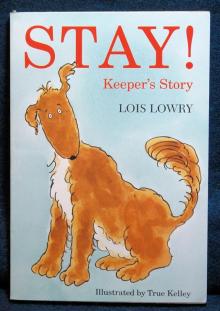 Stay Keepers Story
Stay Keepers Story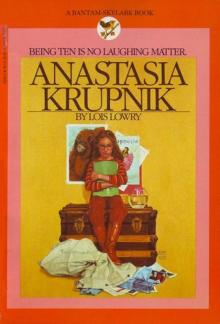 Anastasia Krupnik
Anastasia Krupnik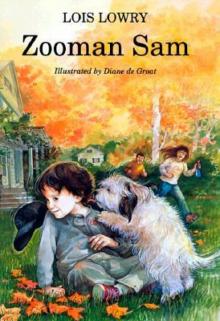 Zooman Sam
Zooman Sam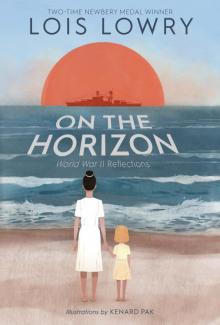 On the Horizon
On the Horizon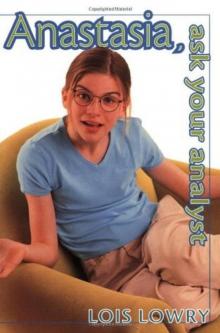 Anastasia, Ask Your Analyst
Anastasia, Ask Your Analyst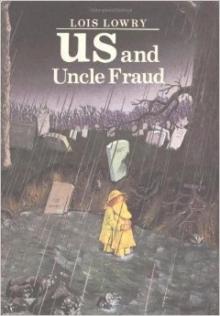 Us and Uncle Fraud
Us and Uncle Fraud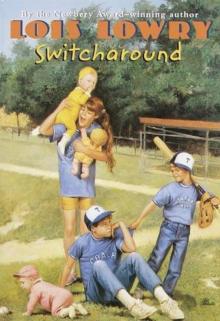 Switcharound
Switcharound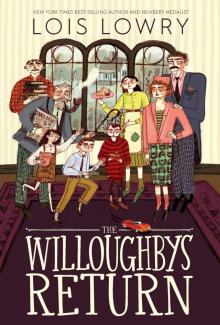 The Willoughbys Return
The Willoughbys Return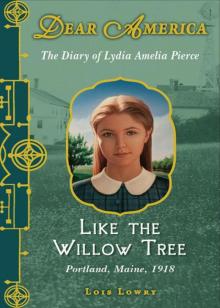 Dear America: Like the Willow Tree
Dear America: Like the Willow Tree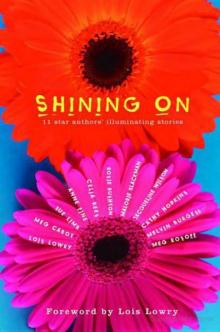 Shining On
Shining On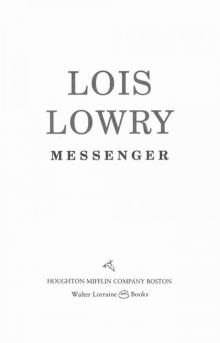 Messenger (The Giver Trilogy)
Messenger (The Giver Trilogy)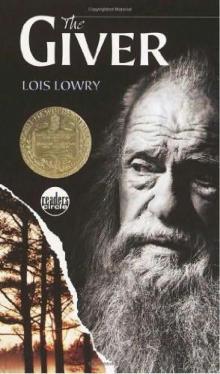 Giver Trilogy 01 - The Giver
Giver Trilogy 01 - The Giver